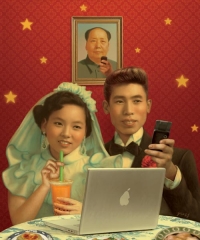 I travelled to South East Asia over my spring break, and one thing that I soon became aware of in the region was that Facebook was inaccessible! Image my horror! Well that was the case in Vietnam at least, where the government restricted the Internet access after the elections. Once we find ourselves in Facebook-less situations, we realize how important a part social media plays in our lives, and how perhaps the focus of our social lives has shifted onto the online platforms. Sad, but true.
I travelled to South East Asia over my spring break, and one thing that I soon became aware of in the region was that Facebook was inaccessible! Image my horror! Well that was the case in Vietnam at least, where the government restricted the Internet access after the elections. Once we find ourselves in Facebook-less situations, we realize how important a part social media plays in our lives, and how perhaps the focus of our social lives has shifted onto the online platforms. Sad, but true.
China is another example of a country where Facebook and Twitter are banned due to government concerns that the social networking system could be a portal for Chinese citizens to see a different way of life and thus disrupt “social harmony”. The social media world without China though is definitely not a connected social media world with 1,6 B people out of it, and the Chinese net economy potential is too huge to be ignored.
That is why the Facebook creator Mark Zuckerberg traveled to China recently. The news is leaked that he has made a deal with Baidu, China’s biggest search engine (Google is not present in China either because they were not willing to agree to censorship enforced there) to create a new social network not connected to Facebook. So what happened to one world, connected? Chinese already have social networks, Renren and Kaixin001 (95 million users) being the most popular ones. They started as Facebook copycats, like dozen others in China, where even the visuals, the colors, the toolbars are literally copied from Facebook, but they are now driving innovation and gaming. Renren, a social network leader with 165 million users, is also a site where people can find love, post their requests, thing they need, which is the first site of its kind in China. These social network sites are the best mirror of China today. Chinese are much more interested in posting online, chatting in chat rooms, blogging, and much more susceptible to ads and marketing. That is why all the luxury fashion brands have flocked to Chinese social networks. The explanation why social networks are so popular among the Chinese, may be in the fact that many of them have for the first time gotten a chance to express themselves personally in a society where the collective has been emphasized over the individual. Social networks are especially popular among young people born between 1980 and 1990, who have gotten a new platform for self expression.
Baidu’s goal here is clear-to use Facebook’s technical and branding expertise in order to create a social network that would topple the current social media leaders in China. Facebook on the other hand, has a lot at stake here. If they want to operate in China they have to abide by the Chinese laws that impose self censorship and spying on user activity. Operating publicly in a country with a horrid human rights situation, will definitely tarnish the Facebook reputation, and providing the country with an addictive network could be seen as providing them with another tool to control its people. So one world, connected is not in the cards any time soon-more money for Zuckerberg-most likely. How much is enough?

4 Responses to One World Connected?